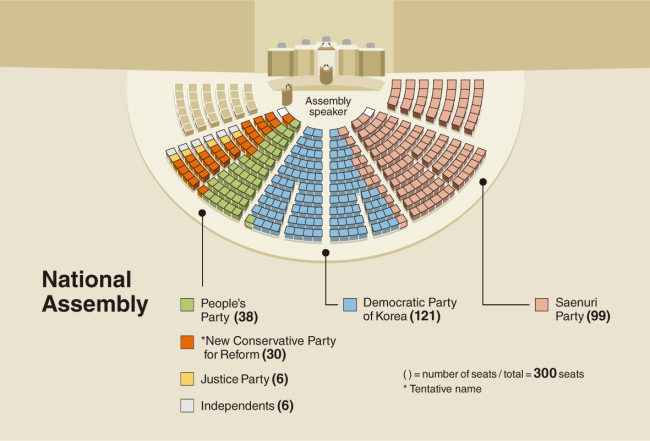The National Assembly’s plenary session Thursday officially endorsed a change in floor dynamics following the breakup of the ruling Saenuri Party.
The country’s 300-seat unicameral parliament now has four negotiating groups, from the previous three, with the main opposition Democratic Party of Korea being the largest.
Reflective of their elevated status on the floor, the Democratic Party’s 121 lawmakers moved to the center of the plenary hall, an area previously held by Saenuri members. Saenuri has been moved to the right of the hall. The remaining seats on the left side of the hall are distributed among the People’s Party, the New Conservative Party for Reform, and lawmakers who do not belong to any of the four floor-negotiating groups.
The floor seats have been rearranged in order of each party’s size.
 |
The country's 300-seat unicameral parliament now has four negotiating groups, from the previous three. |
Saenuri, after the breakup, now has 99 seats compared to its previous 128. The runner-up People’s Party has 38 seats and the splinter group from Saenuri, tentatively named the New Conservative Party for Reform, has 30.
The 30 lawmakers of the New Conservative Party left Saenuri and formed their own group Tuesday, resulting in four major political parties for the first time in Korea since 1990.
During Thursday’s session, lawmakers decided to form a special committee for constitutional revision. The committee will consist of some 35 lawmakers from the four major parties and one from a minor party. When the motion passes, the new committee will be initiated Sunday and will work until June 30.
The approval ratings of parties have also seen some changes. According to pollster Realmeter on Thursday, the Saenuri defectors group placed second in approval ratings, with 17.4 percent, surpassing Saenuri’s approval ratings, which stood at 15.8 percent.
The Democratic Party had the highest ratings, at 33.7 percent.
With the opposition holding the majority in the parliament, liberal parties are seeking for the swift passage of bills. The National Assembly Advancement Act requires the approval of more than three-fifths of lawmakers to put contentious bills to a final vote on the floor.
Although the act prevents the majority party from unilaterally passing controversial legislation, it is thought to have slowed the progress of the National Assembly in the passage of bills.
Saenuri’s split came after President Park Geun-hye’s impeachment by the parliament on Dec. 3 amid the political scandal involving her confidante Choi Soon-sil.
By Jo He-rim(
herim@heraldcorp.com)







![[Today’s K-pop] Blackpink’s Jennie, Lisa invited to Coachella as solo acts](http://res.heraldm.com/phpwas/restmb_idxmake.php?idx=644&simg=/content/image/2024/11/21/20241121050099_0.jpg)
